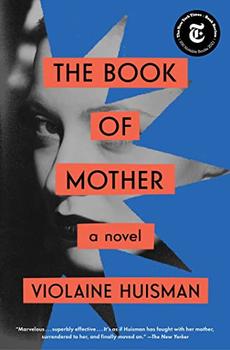Summary | Excerpt | Reviews | Beyond the Book | Readalikes | Genres & Themes | Author Bio

A Novel
by Violaine HuismanExcerpt
The Book of Mother
On the day the Berlin wall came down, I was ten; television screens all over the world glowed with images of people cheering and chanting, swarms of men and women dancing and crying and raising victory signs in front of crumbling stones and debris and clouds of dust; in France, we attended this historic event via the evening news, with fadeouts to the somber face of the anchorman, whom we'd invited to sit down to dinner with us—at least those among us who were sitting down to dinner, who still followed that family ritual and for whom the eight o'clock news had replaced the saying of grace as a sort of prayer for the Republic. I could tell, by the way the pitch of the anchorman's voice fell, that something serious was going on, yet despite his explanations, the geopolitical significance of all this chaos was entirely lost on me. I had no idea of the issues at stake. Still, I was transfixed by the footage, riveted to our television set, in which I discerned—past the glare of the screen, among the ruins, the debris, the rubble—traces of my mother: her mangled face, her scattered body parts, her ashes. Up to that point, I'd admired my mother blindly, rapturously. But now a shadow had fallen over her image. Maman had sunk into a depression so severe that she had been hospitalized by force, for months.
After having been lied to regarding the reasons for Maman's sudden disappearance, I was informed that she was manic-depressive. The words all ran together— your-mother-is-manic-depressive—a sentence pronounced by one adult or another, one of those useless grown-up sentences that only added to my distress. I rolled the words around on my tongue; they became the leitmotif of my torment. Manic-depressive. It didn't mean anything. Except Maman had disappeared from one day to the next. My memories of the events preceding her flight are probably too fragmentary and disjointed to weave into a coherent narrative, but the explanations offered by the adults around me were both implausible and unacceptable. In the end, no one knows my childhood better than I do, apart from my sister, who is two years older and recalls slightly different episodes from the epic of our youth. Only one point continues to elude us: the precise moment of our mother's collapse. The definitive incident, if indeed there was one, seems to have slipped away from both of us, leaving behind only a vague and ominous sense that whatever precipitated her fall almost took us with her. In the absence of any specific catalyst, this memory will have to do: a car crash on the way to or from school, with my sister up front in the death seat and me in back, not wearing a seat belt (as usual), and Maman, stopped at a red light where the avenue George V meets the Champs-Élysées, suddenly accelerating into the intersection as tires screeched and people screamed. It's impossible to tell now how many cars smashed into us in the pileup but there were enough to total our little green Opel.
We were used to Maman's sporty driving habits. She was constantly running late, and she sometimes climbed onto the sidewalks when the roads were backed up, a time-tested method for avoiding traffic jams. Cigarette dangling from her left hand, she'd scream at pedestrians: Get out of my way! We're late! If she hesitated before taking the emergency shoulder lane on the highway, it was only when she suspected cops were around—Look out!—and if the cops did pull us over while she was driving on the sidewalk, or heading the wrong way down a one-way street, or running several red lights and stop signs, all the while insulting numerous drivers, cyclists, and other assholes, my sister and I had been instructed to pretend that we were deathly ill. She would then claim that her two daughters—or one of us, in which case the other one had to assume a worried expression—required urgent medical attention, we were on our way to the hospital, it was a matter of life and death. This strategy worked sometimes, but mostly because of the charm offensive that accompanied it, in which my mother's beauty played a starring role. Maman was one of the most beautiful women to have ever walked the face of the Earth, swore all those who knew her at the height of her splendor, and her beauty was almost as fatal to Maman herself as to the men and women who fell under its sway. It was no surprise that Maman drove like a madwoman, the rules of the road were purely theoretical to her, and pointlessly annoying, although she would, if she saw a truck bearing down on us as we swerved into the wrong lane, retreat: Oh well, he's rather big, that one! But the day she hurled us into the Champs-Élysées she betrayed no interest in self-preservation. I still don't know by what miracle we survived.
Excerpted from The Book of Mother by Violaine Huisman. Copyright © 2021 by Violaine Huisman. Reprinted with permission of Scribner, a Division of Simon & Schuster, Inc.






Your guide toexceptional books
BookBrowse seeks out and recommends the best in contemporary fiction and nonfiction—books that not only engage and entertain but also deepen our understanding of ourselves and the world around us.